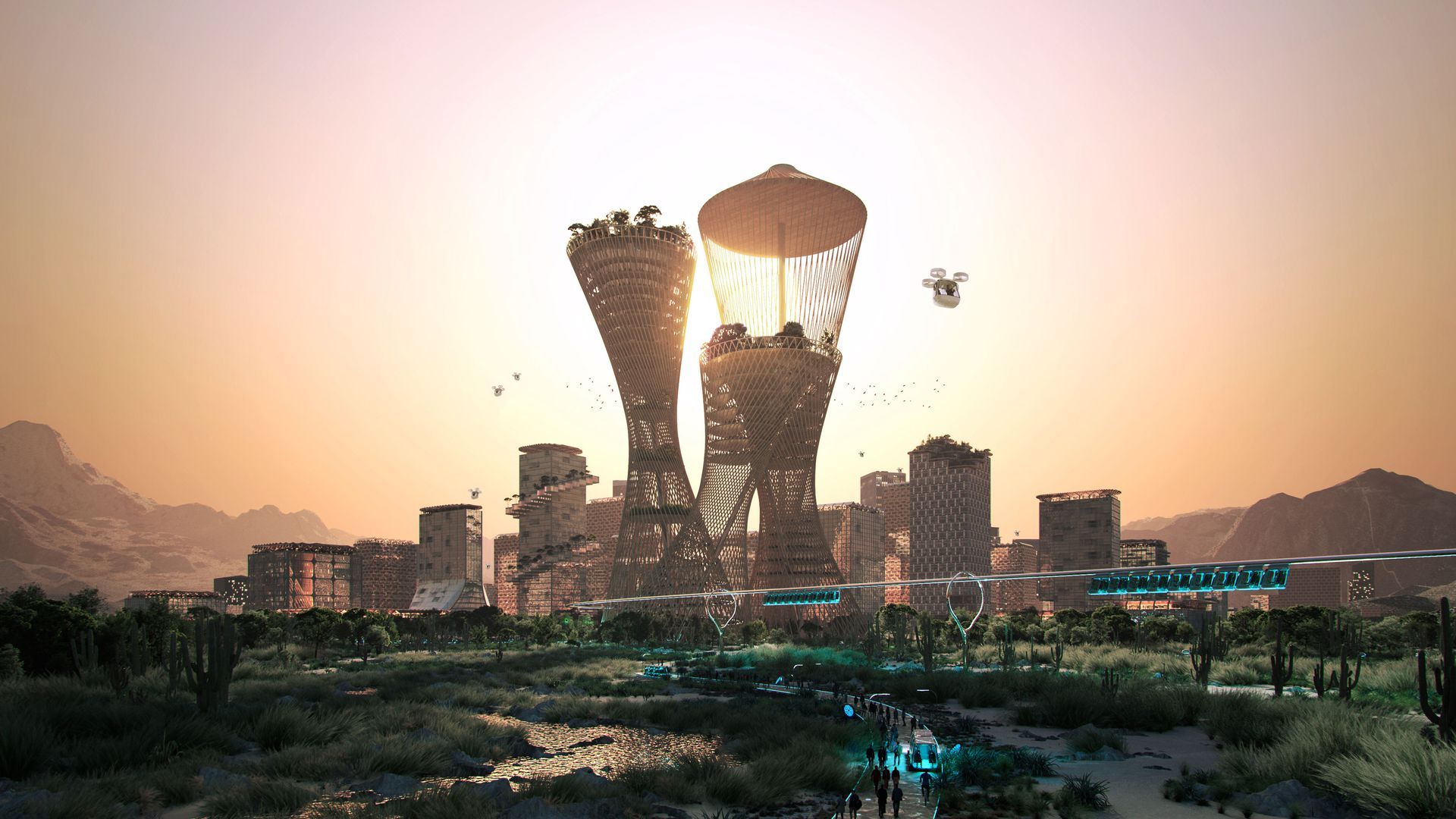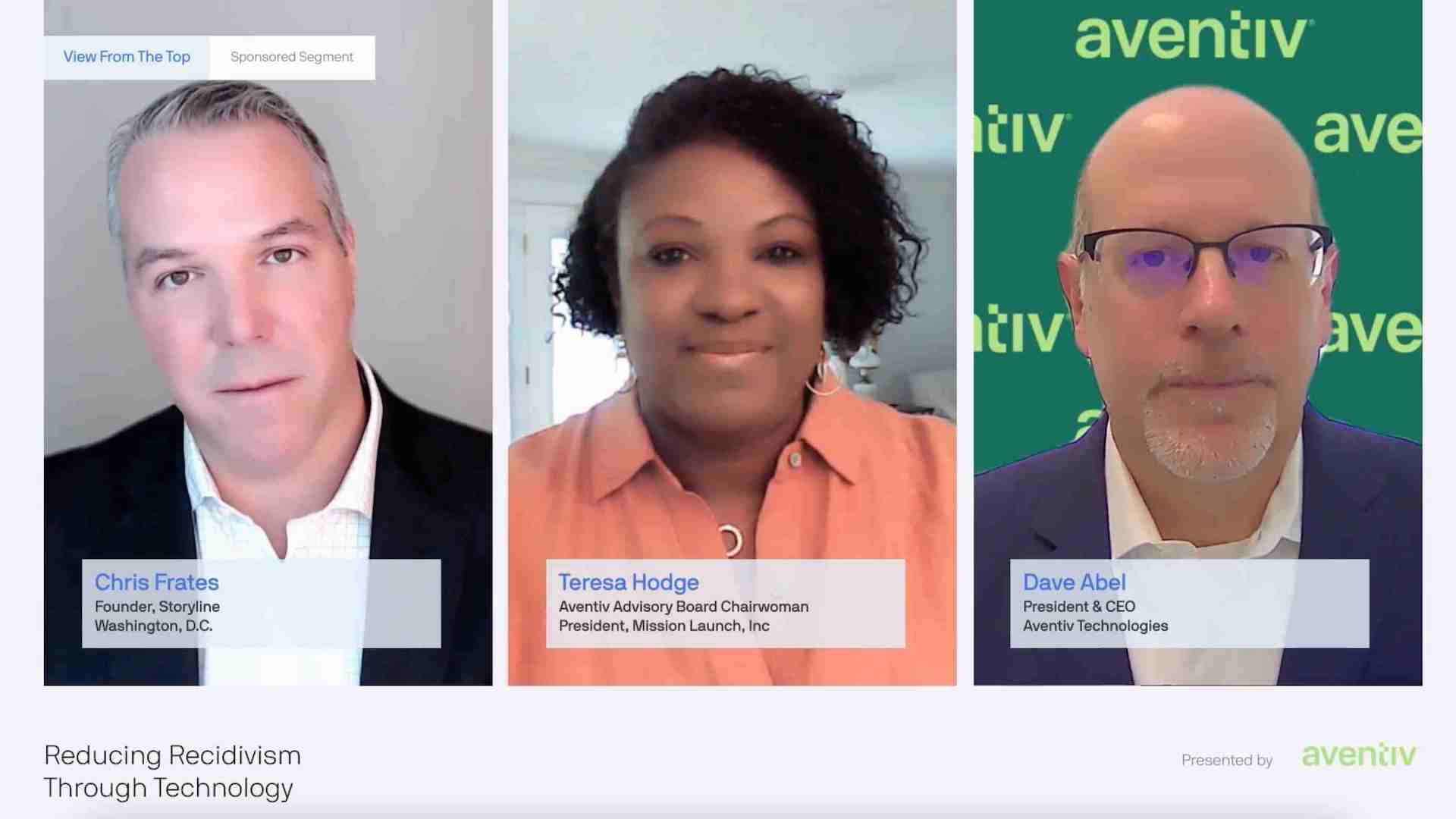| | | | | | | Presented By Aventiv Technologies | | | | Axios What's Next | | By Jennifer A. Kingson, Joann Muller and Alex Fitzpatrick · Aug 25, 2022 | | What kind of city can you build from the ground up with virtually unlimited money? Billionaires across the world are racing one another in a bid to find out, Jennifer reports today. Today's Smart Brevity count: 1,154 words ... 4½ minutes. | | | | | | 1 big thing: The cities of the future |  | | | A rendering of the future city of Telosa, which will be somewhere in the American West. Image courtesy of CityofTelosa.com | | | | Billionaire Marc Lore is fleshing out his plan to build a utopian city called Telosa for 5 million people in the American desert — and he's not the only one with such ambitions, Jennifer A. Kingson reports. Why it matters: There are about a dozen projects worldwide that would create sustainable, hypermodern cities-from-scratch. - While they may never come to fruition, the proposals hint at what the city of the future might look like.
Driving the news: Telosa is set to be built on 150,000 acres in Nevada, Utah or Arizona, and 50,000 people will call it home by 2030, per newly released plans from Lore — a serial entrepreneur who sold Jet.com to Walmart for $3.3 billion. - "We're not just building a new city — this is a new model for society," Lore said at a Telosa "town hall meeting" in July, adding that he wants his community to be "sustainable and equitable to all."
- It'll be governed by a principle he calls "equitism," which seems to be a mashup of democracy, capitalism and socialism.
In Lore's vision, vehicles will be electric and autonomous, and roads won't have curbs (which could hinder differently-abled people), or on-street parking. - Telosa's 36 districts will each be "15-minute cities," where everything a resident needs is a short walk away.
- Every building will be "green," with rooftop panels producing renewable energy.
- The design calls for fresh water to be "stored, cleaned and reused on site," creating a "diverse and efficient water system that is resistant to drought."
The big picture: Telosa is one of a growing number of dewy-eyed ambitions to build centrally planned and sustainable communities on a blank landscape — despite obvious impediments, such as a lack of fresh water. - In Saudi Arabia, Crown Prince Mohammed bin Salman is constructing a megacity named The Line, part of a larger development called Neom.
- The Line's design calls for a city 105 miles long but only 220 yards wide, enclosed by mirrored walls and powered entirely by renewable energy.
- Water will be plentiful, according to the project's claims, through desalinization, wastewater and seawater processing, and smart metering.
- "Saudi projections call for 1.5 million people to live in The Line by 2030," NPR reports, rising to 9 million residents eventually.
- But recent Bloomberg Businessweek reporting suggests the broader Neom project has been plagued by indecision at the top and other problems.
- Floating City in the Maldives is envisioned as a large cluster of hexagonal structures that rise and fall with the sea, with room for up to 20,000 people. It's set to be completed in 2027.
- Toyota Woven City is a company town being built in the foothills of Japan's Mount Fuji. The proposal calls for a 2,000-person city where Toyota "will test autonomous vehicles, smart technology and robot-assisted living," per CNN.
- Masdar City in Abu Dhabi is a "master-planned eco-complex designed to show off the UAE's commitment to sustainability," Bloomberg has reported.
- Net City in Shenzhen, China, is another company town being built by tech giant Tencent. It'll be a Monaco-size metropolis for 80,000 workers, CNN reports.
Other billionaires with city-building aspirations include Bill Gates, who wants to build a "smart city" called Belmont in the Arizona desert, and Elon Musk. Reality check: Some of the claims being made by the utopian planners strain credulity. - In the real world, the promise of smart cities — where intelligent sensors, cameras and Big Data combine to improve everything from traffic flow to city services — has been a consistent disappointment.
The bottom line: The road to utopia is littered with shattered dreams. Share this story. |     | | | | | | 2. California is going all EV, all the time |  | | | Illustration: Brendan Lynch/Axios | | | | California is poised to ban the sale of new gas-powered vehicles starting in 2035, Axios' Nathan Bomey reports. Why it matters: The plan — which other states are expected to copy — stands to dramatically boost EV adoption. Driving the news: The California Air Resources Board will vote today on the proposal, which comes after Gov. Gavin Newsom issued an executive order in 2020 calling for such a ban. Details: Under the rule, 35% of automakers' new sales in California must be zero-emissions vehicles by 2026. - That floor steadily increases each year thereafter, hitting 68% in 2030 and 100% in 2035.
- Some plug-in hybrid sales will still be allowed.
Yes, but: Meeting the 2035 goal will put immense pressure on automakers to accelerate production. |     | | | | | | 3. College seniors stay upbeat |  | | | Illustration: Maura Losch/Axios | | | | This year's inbound college seniors are confident about their post-graduation prospects, but they're also working harder to ensure their success, per new data from entry-level job platform Handshake, Alex Fitzpatrick reports. Why it matters: The kind of job a person gets right after graduation can shape the trajectory of their professional life. By the numbers: 81% of this year's rising seniors think they'll land a well-paying job after college, and 86% believe they'll find work in their preferred field. - But 44% say they'll apply to more jobs than they might have otherwise because of the ongoing economic uncertainty, and 35% are open to alternative fields.
- 74% say they want a high starting salary, the same percentage seeks job stability, and 41% want to work for a well-known brand.
Of note: This year's inbound seniors using Handshake are looking at more jobs on average than last year's, at about 37 vs. 31. What they're saying: "The class of 2023 is a resilient cohort — they've come of age in the midst of a global pandemic, geopolitical unrest and a major racial reckoning," says Handshake chief education strategy officer Christine Cruzvergara. "As a result, we see them as both optimistic and anxious about the future." Methodology: Handshake surveyed 1,432 jobseekers from the classes of 2022 and 2023 between June 13-31, breaking out results by class. |     | | | | | | A message from Aventiv Technologies | | Bridging the digital divide inside prisons | | |  | | | | Aventiv Technologies is putting over 600,000 secure tablets into the hands of incarcerated individuals. Here's why: Access to support networks and educational materials creates more peaceful, productive facility environments and reduces recidivism rates. See the impact. | | | | | | 4. What you're saying: Private jet bans |  | | | Photo: Aviation-images.com/Universal Images Group via Getty Images | | | | Should private jet flights be restricted? Here's what What's Next readers said: - "I'd like to see a truly significant tax based on fuel consumed, and the money raised going towards the underfunded and promised $100 billion annually to less-developed countries for climate financing," says Robin Chase.
- "Don't restrict/ban/control, rather require carbon offset purchases at a multiplier to have the users of such private jet travel offset their use," writes Joshua Sroge.
- "As an airline captain of a major U.S. carrier, I see private jet flights as a pragmatic necessity," emails Miro Cetl. "Because of the public's obsession with ultra-celebrities, their presence on a commercial flight could easily become disruptive as other passengers gawk and attempt to get photos or autographs."
|     | | | | | | 5. One fun thing: Teen pilot sets solo record |  | | | Rutherford during a refueling stop at John Wayne Airport in Santa Ana, Calif. Photo: Paul Bersebach/MediaNews Group/Orange County Register via Getty Images | | | | 17-year-old Mack Rutherford set a new record yesterday as the youngest person to fly solo 'round the world in a small plane, the Associated Press reports. Details: Rutherford's flight began March 23 in Bulgaria, and his route included 52 countries. - He flew a modified ultralight Shark, with the second seat swapped for an extra gas tank for better range.
Of note: Before Rutherford's flight, the youngest person to fly solo around the world in an ultralight plane was his 19-year-old sister, Zara, who made the journey earlier this year. |     | | | | | | A message from Aventiv Technologies | | "I knew that technology was going to be how I got back on my feet" | | |  | | | | Teresa Hodge, Aventiv Advisory Board chair, came home from prison to support others — through technology. Why it's important: "I believe the more we allow technology to be used for individuals who are coming home, we're going to see those recidivism rates lower," she says. Find out more. | | | | A hearty thanks to What's Next copy editor Amy Stern. Was this email forwarded to you? Get your daily dose of What's Next magic by signing up here for our free newsletter. |  | | Are you a fan of this email format? It's called Smart Brevity®. Over 300 orgs use it — in a tool called Axios HQ — to drive productivity with clearer workplace communications. | | | | | | Axios thanks our partners for supporting our newsletters. If you're interested in advertising, learn more here.
Sponsorship has no influence on editorial content. Axios, 3100 Clarendon Blvd, Arlington VA 22201 | | | You received this email because you signed up for newsletters from Axios.
Change your preferences or unsubscribe here. | | | Was this email forwarded to you?
Sign up now to get Axios in your inbox. | | | | Follow Axios on social media:    | | | | | |
Post a Comment
0Comments